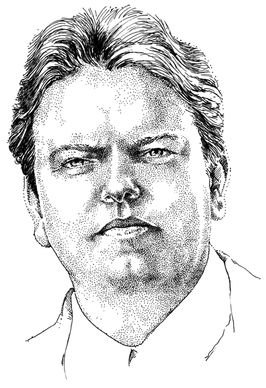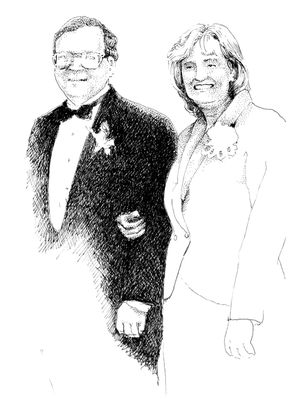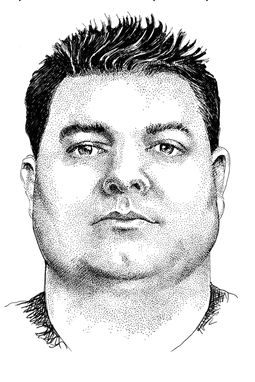Jerry Langton Three-Book Bundle (36 page)
Read Jerry Langton Three-Book Bundle Online
Authors: Jerry Langton

Lynne Gilbank was a very successful corporate lawyer who lived in Ancaster, Hamilton's nicest suburb. But at the age of 49, she decided to give more back to the community and switched to criminal law. She was interested, in fact, in becoming a public defender. One of her first clients was a man named Bill Smith who was being held in the Maplehurst Detention Centre in nearby Milton.
André Gravelle

He told her quite a story. He was a contractor living on Manitoulin Island with his fiancée when he was approached by Denis Gravelle, to spruce up his cottage there. Denis was so impressed with his work that he asked Smith to come to Hamilton to install a sauna in his brother Paul's house. The Gravelles set Smith and his new wife up with an apartment and he went to work.
Right away, Smith realized the Gravelles were not ordinary businessmen. Hash and hash oil was everywhere, and so was cash. And Smith reported seeing Johnny K-9 at Paul's house regularly. On one occasion, one of Paul's “runners” (drug deliverymen, usually area teenagers) made a very bad choice and “mouthed off” to him. Smith testified that he had witnessed Johnny brutally beat the young man in Paul's basement. According to Smith, the runner's face was “smeared all over the wall” and there was blood from one end of the room to the other. The runner suffered a broken orbital bone, nose and jaw.
When Smith finished the sauna, he had planned to take his wife on vacation in Niagara Falls, less than an hour's drive from Hamilton. But Paul said he'd pay their way to a fancy resort in Jamaica â and pay him a little extra â if he'd just do him a little favor. He also told him: “If you get caught, just plead guilty; we have lawyers who'll take care of you.”
He did get caught. After a week in Ocho Rios, a tanned Smith and his wife were arrested in Toronto's Pearson International Airport on February 11, 1997 with $500,000 worth of hash oil hidden in their double-locked Samsonite hard-sided bags. Smith called Paul. The gangster laughed and told him not to worry, he'd get him a lawyer, they'd plead guilty and get 18 months, probably serve less than a year.
But Smith wasn't interested in playing the good soldier. He got his own attorney. Out of the Yellow Pages, he hired Gilbank. She did her research. She found that the Gravelles had been arrested many times, but had spent little time behind bars through fancy legal work and by offloading the blame to inferiors. She was outraged. She told everyone who would listen about what monsters the Gravelles were, how she was sure they were capable of murder. Smith was surprised that a defense attorney would be so interested in prosecuting bad guys, but admitted she had “a real hard-on for these people; and she definitely was gonna step on some toes.”
Police stepped up their investigations of the Gravelles' activities. One of the brothers, 37-year-old Danny, was stopped on the 401 while driving his truck from Halifax back to his home in Burlington. The police found 314 kilograms of hash ($12 million worth) hidden in the tubing of the boat trailer he was pulling. He received 15 months of house arrest after pleading guilty. Denis was caught with $20,000 worth of hash oil on his way to Manitoulin Island.
Smith was leaving the Hamilton courthouse when he was approached by a man later identified in court as Denis's lawyer. Smith told Gilbank the man said to him: “You're the one that ratted out Denis.” She put him in the witness protection program that day.
The arrests didn't stop. Danny and André were implicated in a scheme to import $12.5 million worth of hash oil in May 1998, and Paul's son Christian was caught with $160,000 worth of marijuana and hash oil on him in October.
Realizing things were heating up, Gilbank told her daughter, Kristen, who worked in her law office, to be careful.
Fred and Lynn Gilbank

Somewhere between 5:15 and 5:30 on the chilly morning of November 16, 1998, the residents of Ancaster's exclusive Postans Path neighborhood heard loud blasts and then the sound of a car's doors slamming and of it peeling rubber to get away in a hurry.
Someone had broken into the Gilbanks' home and killed Lynn and her husband, software consultant Fred, with close-range volleys from a large-barrelled shotgun.
What followed was one of the longest and costliest murder investigations in Canadian history. In 2004, police offered absolute immunity to anyone who would talk. Nobody came forward. Finally, on January 6, 2005, Johnny K-9 was charged with two counts of first-degree murder for the killing of the Gilbanks. At the end of March, André Gravelle was also charged with two counts of first-degree murder, and Johnny's friend Jack Howard was charged with being an accessory after the fact. The police admitted they didn't believe either André or Johnny actually pulled the triggers on the gun or guns that killed the Gilbanks, just that they ordered the hit in an attempt to stop her from continuing to investigate and prosecute the Gravelles.
When the charges were made public, the media tracked down Paul Gravelle, who had retired to a luxurious home on Mexico's Pacific Coast. He was asked if he was, as the prosecution alleged, the kingpin of the Gravelle brothers crime family. “There's 12 in our family and only the boys have a criminal record. And not all of them. That's just pure fabrication,” he said, smiling. “I've just gone out of it altogether now. I've retired. It's no secret, yes, I was a drug importer. Mostly hash oil and marijuana.” Then the reporter asked if he gave the order to have Lynn and Fred Gilbank killed. “No. That's not true,” he said. “Our family is not killers ... That's beyond us to do a thing like that. That's a despicable act. That's a cowardly act.”
It was an ugly trial. Even the lead investigator, Steve Hrab, admitted much of the evidence was circumstantial. Despite six years' worth of evidence, including thousands of wiretaps, the Crown didn't have much against the pair. And they lost a great deal of their ammo when the testimony of a lip-reader (who had been paid more than $20,000 to tell them what Johnny was saying in a videotape of a meeting in a restaurant) was thrown out because she had been found guilty of perjury in a trial in England and because, when tested for her ability, she was only able to decipher 55 percent of the words spoken by people right in front of her.
At the summary of the original bail hearing â André was released on $2 million bail â Justice Donald Gordon told the Crown that their case was “less than strong” and that “I am satisfied the issue of an alternate suspect is very real.” On June 12, 2006, the Crown dropped all charges against André, Johnny and Howard and announced they were re-opening the case.
The Gilbanks' children â both adults â went on CTV's
W5
newsmagazine and blamed the collapse of the case on corruption within the Hamilton police and the Ontario justice system. They claimed that someone was leaking evidence to the Gravelles from the police force. Hamilton police chief Brian Mullan went on the show and denied their claims and pointed out that the OPP had already spent months investigating the Gilbanks' claims and found no evidence to move forward. Ontario Attorney General Michael Bryant â now more famous for his fatal run-in with a drunken bicyclist than anything he ever did in office â called the claims “false, baseless, scurrilous and potentially libelous and defamatory.”
W5
newsmagazine and blamed the collapse of the case on corruption within the Hamilton police and the Ontario justice system. They claimed that someone was leaking evidence to the Gravelles from the police force. Hamilton police chief Brian Mullan went on the show and denied their claims and pointed out that the OPP had already spent months investigating the Gilbanks' claims and found no evidence to move forward. Ontario Attorney General Michael Bryant â now more famous for his fatal run-in with a drunken bicyclist than anything he ever did in office â called the claims “false, baseless, scurrilous and potentially libelous and defamatory.”
Johnny was asked to be on the show, but declined. Instead, he sent the following message via e-mail:
I am suing for what happened to me so I cannot provide an interview for your program. I do want to say that what happened to me was wrong. I did not have anything to do with the murder of Mr. and Mrs. Gilbank and do not know who did. It is wrong that after six years of investigation â they watched everything I did and wiretapped all my calls â after six years of investigating me, the police did not find any evidence I committed this crime â everything showed that I'm innocent, but they charged me with two murders I did not commit â I sat in jail for months when there was no case, no evidence that I was guilty. What happened to me was not right, it should not happen to anyone.
André filed a $25 million lawsuit against 20 officers (including Chief Mullan), Bryant and the lip-reader. “I was wrongfully charged for the murders of the Gilbanks,” he said. “I want the truth to come out and for the record to be set straight for myself and my family.” Johnny â who, unlike André, logged some serious jail time because he didn't make bail â launched a similar suit for $15 million.
And the case brought down the career of Inspector Rick Wills, Hamilton's top drug cop. Wills had arrested André Gravelle a few times, and had alleged that he'd heard that André had hired Johnny to kill him, but that after talking with André, things cooled down. Wills â who once dined and chatted with Prince Charles as a representative of the Hamilton police â retired abruptly. The investigation of him that began with his part in the handling of the Gilbanks netted even more charges of corruption, including the alleged theft of $57,000 from the police evidence locker.
André went back to business and was arrested a couple more times, but received only probation.
Johnny â the failed minor-league hockey player, failed wrestler, failed biker and allegedly successful hitman â left Hamilton for the west coast. He reunited with his common-law wife and their two sons (then aged five and eight) and told a wrestling fan magazine that he was having the time of his life in Vancouver. “It's beautiful out here, oh my God; the ocean, the mountains,” he said. “Hamilton makes me puke now when I think about it; all those years wasted sitting there in that garbage, you know what I mean?”
And he had a new job. Johnny had done plenty of work as a bouncer in the Hammer, but in Vancouver he rented himself out as a celebrity bodyguard, counting Jack Nicholson and Cyndi Lauper among his clients. “I love it!” he said of his new profession. “I dress up nice, eat the best food, just hang around and make sure nobody screws with these people.”
And like so many Canadian bikers, he said he planned to write a book about his experiences. “This will be a bestseller,” he predicted. “I've been on every extreme in the world â the bikers, I was a wrestler, Major Junior A hockey player for the Kitchener Rangers â I've done a lot of things people can only dream about.” He forgot to mention that he also had a part in the low-budget comedy-action movie
Oklahoma Smugglers
as “Wrestler No. 1.”
Oklahoma Smugglers
as “Wrestler No. 1.”
Things looked good for Johnny, but once again he picked his friends poorly.
Chapter 16Dead, in Prison or On the Run
It's ironic that the United Nations gang, like so many others, was founded specifically to be in opposition to Hells Angels. It started with two young men, James Coulter and Clayton Roueche from Abbotsford, B.C., who hung out and went to raves together in the late '90s.
“It started slowly. I started using E â ecstasy â just to stay awake and stay balanced because when you take ecstasy and you drink, it sort of counterbalances, you don't get high from ecstasy and you don't get drunk from drinking. But as soon as the ecstasy wears off, you are super, super drunk,” Coulter said. “Then I just started using crack, just for an extra high. Maybe it was just to take stress away, I don't know.” Like many young men who like to take drugs, they started selling them in order to pay for more.
Clayton Roueche

Other books
Goodbye, Rebel Blue Hardcover by Shelley Coriell
The Saucy Lucy Murders by Cindy Keen Reynders
Historia de la princesa Zulkaïs y el príncipe Kalilah by Clark Ashton Smith William Beckford
Deliberate Display - five erotic voyeur and exhibitionist stories by Felthouse, Lucy, Marsden, Sommer, McKeown, John, Yong, Marlene, Thornton, Abigail
Insectopedia by Hugh Raffles
A Summer in Paradise by Tianna Xander
Lightly Poached by Lillian Beckwith
Sebastian - Secrets by Rosen, Janey
The Rithmatist by Sanderson, Brandon